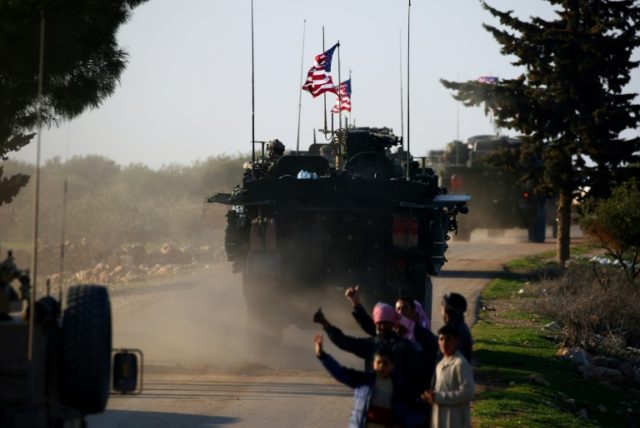Assistant Defense Secretary Robert Karem told the House Armed Services Committee on Wednesday that American troops in Syria are tasked not only with smashing the Islamic State and al-Qaeda but deterring Iranian ambitions.
“Our military operations in Syria are squarely focused because of the authorities we have been provided against ISIS and al Qaeda,” Karem said.
“It is, of course, the case that our presence in Syria, our military presence has residual benefits, benefits for our diplomats who are trying to seek a negotiated end to the conflict and residual benefits because it can help deter activities from other adversaries. There are aspects of our military operations or presence that can be useful in countering Iran,” he continued.
Karen and Joint Staff deputy director Brig. Gen. Scott Benedict explained that U.S. troops can restrict Iran’s movements merely by occupying ground denied to the Iranians and keeping them under close observation. As Military Times reported on Thursday:
“Our role is to defeat ISIS,” Brig. Gen. Scott Benedict, deputy director for the Joint Staff, said during the hearing. “Certainly being on the ground and creating a stabilized situation there limits the freedom of maneuver of anybody who has malign intentions. That includes Iranian proxies as well as violent extremists.”
…
Karem and Benedict cited Iran’s proliferation of advanced conventional weapons and funding for Shia militias as reasons to counter its influence in the region. A display of captured Iranian weapons exports can be viewed at Joint Base Anacostia-Bolling in Washington and Karem urged members of Congress to visit the set-up.
“Our presence in certain places can constrain Iran’s freedom of maneuver, it can empower our diplomats to put more pressure on Iran, but our purpose in being there and our military operations are not being conducted against Iran,” Karem said.
Karem’s comments were consistent with statements made this week by National Security Adviser John Bolton and Defense Secretary Jim Mattis. Bolton essentially said the same thing as Karem, while Mattis declined to make any statements about the Iranians in Syria but said there is “no daylight” between himself and Bolton.
“We’re not going to leave as long as Iranian troops are outside Iranian borders, and that includes Iranian proxies and militias,” Bolton declared from the U.N. General Assembly on Monday.
Mattis was less emphatic about checkmating Iran in Syria, but he did say Iran is a pernicious element in the Middle East and he is “on the same sheet of music” as Bolton.
“Right now our troops inside Syria are there for one purpose, and that’s under the U.N. authorization about defeating ISIS,” Mattis said.
“As part of this overarching problem, we have to address Iran,” he added. “Everywhere you go in the Middle East where there’s instability you will find Iran. So in terms of getting to the end state of the Geneva process, Iran, too, has a role to play, which is to stop fomenting trouble.”
The “Geneva process” Mattis referenced is the United Nations effort to conclude the Syrian civil war. Mattis said the war would have ended long ago without Russian and Iranian intervention.
Rep. Seth Moulton (D-MA) of the House Armed Services Committee found the ambiguity about the role of U.S. troops in Syria somewhat confusing.
“My question to the Trump administration is this: what is your strategy?” Moulton asked Karem on Wednesday.
“Moreover we don’t even know what your long-term objectives are. I’m alarmed that the president’s statements regarding Syria have been so overwhelmingly at odds with his senior cabinet officials,” Moulton added, referring to President Donald Trump’s expressed desire to get U.S. troops out of Syria.
Rep. Vicky Hartzler (R-MO) noted that meddling by outside forces has made the situation in Syria “extraordinarily complex.”
“Turkey, Iraq, Israel, and Jordan are profoundly affected,” she said. “The fact that Russia and Iran vigorously support the Assad regime also greatly complicates our efforts.”
Rep. Austin Scott (R-GA) reflected that Russia had a fairly clear goal in Syria, securing dictator Bashar Assad in power, and few legal obstacles to accomplishing that goal, while the United States faces a shifting “kaleidoscope” of objectives and restrictions. Conversely, he worried about the danger of broad authorizations written against international terrorist organizations like ISIS becoming open-ended warrants for long-term interventions against other threats.

COMMENTS
Please let us know if you're having issues with commenting.